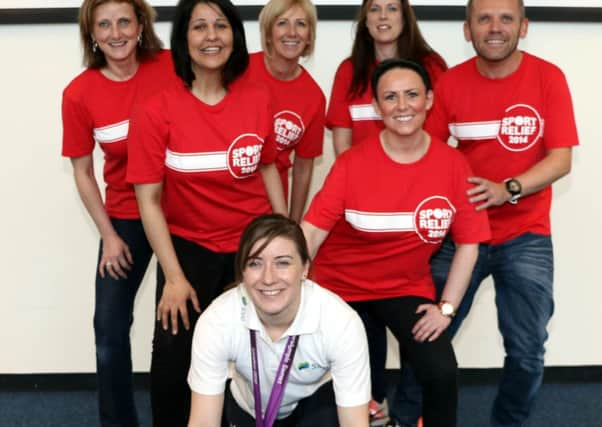Glasgow 2014: Clegg wants to run able-bodied races


That will change this summer, when 270-odd sportspeople descend on a contrived village in Glasgow with the shared aim of making the Commonwealth Games a success for the home team. But it is hard to pinpoint the moment at which Clegg will start to feel fully Scottish, especially when confronted with the news that she doesn’t like curling.
“This year was the first time I’ve ever seen the Winter Paralympics on TV, and I watched loads of it,” the partially sighted sprinter tells us. “I’m a Para myself and I’d never seen it before so I don’t imagine many members of the public had seen it before. It looked brilliant. I was very impressed with the skiing and the ice skating – I couldn’t do that. I’m not sure about the curling, though. It looks too serious for me. It’s too confusing and there’s too much brain fuel needed. It’s very tactical, and I’m a simple-minded person.”
Advertisement
Hide AdAdvertisement
Hide AdSo much for the theory that the only thing more egotistical than a runner is a sprinter. If Clegg has an ego she must have an alter ego who minds it for her. She doesn’t seem to betray any inconsistency of mood, either. Perhaps we can partly attribute her easy disposition to the fact that parasport athletes have never been more appreciated. The London Paralympics took what had been a gradual culture shift and amplified it dramatically to the point where physically disadvantaged athletes no longer felt like the beneficiaries of sympathy. Glasgow 2014 should make a difference, too.
“For anyone doing parasports, everything has massively changed. We went to the IPC [International Paralympic Committee] World Championships last year in France and there were local people turning up to watch. It was free, but it has been free in the past and no-one has turned up. In France they were getting turned away because there wasn’t enough room. We’ve never had that before and it’s great,” she says.
“With the Winter Paralympics, Channel 4 made you feel like you were part of the athletes’ journey and they made it really easy to follow what was going on. I think the para movement has really moved forward.”
In Glasgow, there will be events outwith the able-bodied programme in athletics, swimming, bowls and cycling. It is the biggest proportion of parasports that the Games has known, and the events have been carefully chosen to ensure both that the pro-Scots crowd will have prominent medal prospects to cheer and also that the likes of Clegg, Meggan Dawson-Farrell and Aileen McGlynn blend in to the point where it is not immediately evident to the crowd that they are watching something ‘different’.
“The events change from Games to Games and there are para-events in Glasgow and they obviously picked some events that they’ve got some decent Scottish athletes in. It’s fair enough I think – if you’ve got the choice you’ve got the choice,” says Clegg, who hails from Cheshire and moved to Scotland with her family aged 12.
“I think it will be quite nice having an integrated programme, and we’re not like a warm-up act or a closing act – we are completely integrated into the programme, which is really good because we’ll actually have people there watching us compete.”
London’s legacy is one of the reasons for this, but Clegg helped to make that Paralympics such a wonder. She won silver in the T12 100m with her guide, Mikhail Huggins, breaking a European record along the way. She also won silver in Beijing in 2008, when aged just 18, and has one gold, three silver medals and one bronze medal at the World Championships. Olympic gold remains a goal, as does Commonwealth gold, but there is another more continuous aspiration that will frame her career in the coming years.
She would like to run in able-bodied competitions, guide and all, and has not ruled out breaking through the unseen barrier this summer.
Advertisement
Hide AdAdvertisement
Hide Ad“I wouldn’t say it if it wasn’t a possibility. It’s a challenge, and, fingers crossed, I can run the qualifying times and they [Team Scotland selectors] will take me,” she says. “If I don’t do it, I can try it another year – I am still going to set myself that challenge. It is quite realistic. I reckon I need to get in the top three and I am in the top four or five [100m sprinters in Scotland] at the moment. So it’s interesting.”
Clegg would not be the first Paralympian to cross over. Quite apart from Blade Runner Oscar Pistorius, runners such as Ireland’s Jason Smyth, like Clegg a sufferer of Stargaardt’s, have already proved it is possible. But won’t the presence of Huggins, her fully-sighted guide, be problematic in this regard?
“I’ve spoken to people about it and they don’t think it will be an issue,” she says. “I’d still be allowed two lanes, I think, and I can still run in one lane anyway. But we’ll probably cross that bridge when it comes. I run quicker with Mikhail, so it would make sense.”
l SSE Home Nation ambassador, Libby Clegg joined forces with SSE staff in Cumbernauld who are taking part in a wide range of fund-raising activities for Sport Relief; from 24 hour rowing competitions to A Question of Sport quizzes with Olympic and Commonwealth Games medallists